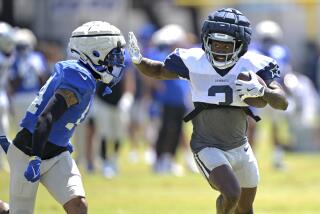The NFL’s Summer Camp-Out
- Share via
One of the most popular Pittsburgh Steelers is threatening to sit out the season. The weightiest Green Bay Packer says he wants to be cut or traded. The best player on New England’s defense is risking a $6,000-a-day fine to make his point.
When NFL training camps get into full swing this weekend, several key players will be watching from afar, locked in contract disputes with their teams. Among the disgruntled are Pittsburgh receiver Hines Ward, Packer defensive tackle Grady Jackson and Patriot defensive tackle Richard Seymour.
Then there’s the back-and-forth saga of Philadelphia receiver Terrell Owens, unhappy with his deal just one year into a multiyear contract; and dozens of unsigned draft picks whose agents are engaged in eleventh-hour negotiations to get their clients into camp.
So how long can a player hold out before a coach starts holding it against him?
“Let me see,” Dallas Cowboy Coach Bill Parcells said Friday, lifting his arm to look at his watch. “Our first meeting starts in six minutes.”
As of Friday afternoon, the Cowboys had yet to sign their first three draft picks, but were not anticipating any long-term contract disputes. The team opens the workout portion of training camp today in Oxnard. The team’s last protracted contract impasse came in 1998 when second-round pick Flozell Adams missed the first six days of camp.
NFL rules prohibit players from reporting to camp without a signed contract in place. Rookies can, however, participate in mini-camps before their deals are done.
Asked if the league should allow rookies to at least attend position meetings while their contracts are being worked out, Parcells said no. (That, of course, would reduce the leverage enjoyed by teams, who argue a young player falls woefully behind with each day missed.)
“I think that’s a good rule,” he said. “You’d be setting yourself up for a lot of what-ifs, contingencies and probably legal issues if it were different. These are employees, they have a contract, and they’ve agreed to perform. Until that point, they’re really not employees.”
It has become more common in recent years for some rookies to miss a day or two of camp, often because their teams wait so long to begin negotiations. The Cowboys, for instance, didn’t extend a first offer to their second-round pick, linebacker Kevin Burnett, until Wednesday, three days before the start of camp.
Because he is not under contract, a rookie no-show is not technically a “holdout,” nor can he be fined by his future team.
There are several reasons teams delay rookie negotiations. First, a rookie salary cap was instituted in 1993, meaning teams have a limit on how much cap space they can use on their draft picks and rookie free agents. That adds another level of complexity to negotiations. It’s also to the team’s benefit to put maximum pressure on players and their agents; narrowing the negotiating window does that.
Then, there’s plain old procrastination.
“There’s an ever-present tendency in football to do everything at the last minute and not concentrate on a project until there’s pressure to do so,” said agent Leigh Steinberg, who has had 55 clients selected in the first round, among them eight No. 1 picks.
Steinberg says there is a significant difference between what he calls “administrative” cases -- players who miss a day or two of camp while their contracts are completed -- and those locked in true contract battles, ones lasting a week or longer.
Dug-in disputes can result in a player’s losing valuable ground in the competition for starting jobs and can put the player on the wrong end of a public-relations fiasco. After all, Steinberg said, it’s hard for most fans to sympathize with a star player haggling over the difference between paydays of, say, $10 million versus $12 million.
For some players, the tension of holding out makes them long for those grueling two-a-day practices under the summer sun. Almost anything beats the waiting and wondering.
“It’s an exceptionally hard process,” Steinberg said. “Players will constantly go through mood swings. At 10 a.m. they’ll be saying, ‘I never want to play for that team again.’ At 2 in the afternoon they’ll say, ‘I have to get into camp in the next hour.’ ”
Pittsburgh’s Ward, a four-time Pro Bowl receiver, says he’s prepared to sit out the season if he doesn’t get a contract extension that will place him among the league’s highest-paid players at his position.
“I don’t want to see it come to that,” he told reporters Thursday before a promotional appearance in Pittsburgh. “I love playing football, I love putting on the black and gold, but what’s fair is fair, and that’s all I can really ask for.”
More to Read
Go beyond the scoreboard
Get the latest on L.A.'s teams in the daily Sports Report newsletter.
You may occasionally receive promotional content from the Los Angeles Times.











